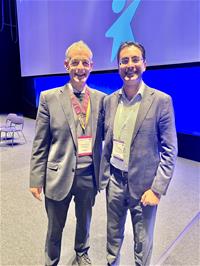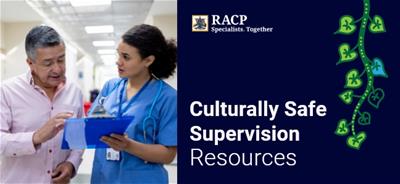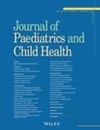Pot-pourri eBulletin - 30 April 2025

After a rigorous selection process, Associate Professor John Collins AM (of the Children’s Hospital at Westmead) has been awarded this year’s Howard Williams Medal for “outstanding contribution to Paediatrics & Child Health in Australia and/or Aotearoa New Zealand”. In Associate Professor Collins’s case, his nominator referenced how “…he commenced many streams and themes of work that have seen a ripple effect and have manifest in different outputs within paediatric pain and palliative care within Australia and New Zealand.” Associate Professor Collins’s work in the fields of paediatric pain medicine and paediatric palliative care, as well as the broader areas of community and home care, have touched so many lives, including those of other paediatricians who have been inspired by his work. I can’t think of a more deserving recipient of our most prestigious award.
In other news, I recently attended the Royal College of Paediatrics & Child Health (RCPCH) Conference 2025 held in Glasgow, Scotland. It was my great pleasure to catch up with RCPCH President Professor Steve Turner, as well as having the privilege to present a plenary session on The Principles of Patient-centric Care: Reflections on Ryan’s Rule and Beyond. The plenary was particularly relevant in the British context with the recent implementation of patient/parent-initiated escalation of care called Martha’s Rule throughout NHS England . The audience was very keen to learn from the Australian experience over the last 10 years and I have been asked to write a piece on this in the NHS newsletter. I will share this with you in my next monthly message. As always, it’s very rewarding to meet with our colleagues from other paediatric organisations and to discuss our shared challenges and hopes for the future.

The College has recently published a statement on gender care which voices support for all our paediatric, adolescent, and adult medicine physicians and trainees working in this complex space to care for young people and their families. You can read the full statement here.
As part of the College’s on-going engagement with the Department of Health and Aged Care (DoHAC), the PCHD President, the College Dean and other staff recently met with the members of the DoHAC Health Workforce Division Modelling and Data Analytics team. This team is responsible for Health Workforce supply and demand modelling and is currently preparing to look at the Paediatric and Child Health workforce. The focus of this meeting was on the supply side of the modelling as the team are keen to ensure that they have the right inputs. It is likely that further meetings will be held if more information is needed regarding demand and also to discuss the supply side of the modelling.
Last month, I congratulated the candidates who sat and passed the Divisional Written Examination in February. This month, I wish to pass on my very best wishes to all those who are preparing to undertake the PCH Divisional Clinical Exam in May. I understand this must be a stressful time as you approach such an important milestone in your career but know that your colleagues have faith in your skills and experience, and we are all cheering you on to success.
Last but definitely not least, ahead of the Australian Federal Election called for Saturday, 3 May 2025, the College has released its 2025 Election Statement in which a number of priority areas are clearly outlined. I would urge all PCHD members to use this statement whenever possible to help advocate for a better healthcare future for our patients, their families, and the wider Australian community.
Professor Nitin Kapur
PCHD President
Several positions are available on PCHD committees. Please consider applying for suitable positions and/or encouraging your colleagues. If you have any questions about any of the PCHD committee positions, please contact Paed@racp.edu.au.
As your medical College and CPD provider, we're required to include medical registration numbers in our CPD compliance reports to the Medical Board of Australia. To help us maintain accurate records and prevent any reporting errors, we kindly ask you to take a quick moment to confirm or provide your Ahpra registration number.
Here's how you can easily do this:
- Log in to MyRACP
- Review your captured registration number
- Confirm or update if needed
For any questions, please contact Member Support.
Newly added resources now available to support Culturally Safe Supervision

The RACP’s Culturally Safe Supervision project continues to deliver valuable resources aimed at strengthening cultural safety in supervision across health settings.
Funded by the Australian Government through the Flexible Approach to Training in Expanded Settings (FATES) program, this project aligns with the College’s strategic priority to foster a culturally safe environment. It also supports Fellows in meeting the cultural safety professional standard.
A range of resources are available through RACP Online Learning, accessible to both members and non-members. The most recent additions to the culturally safe supervision suite include:
Explore the full suite of available resources and stay updated as more educational materials are released.
This dedicated space serves as your go-to resource for all things related to the Gender Equity in Medicine Action Plan and the Membership Diversity and Inclusion Action Plan. It is a living resource and will continue evolving as we move forward with the implementation of the action plans and as new resources become available.
Find out more about:
Find out more
Reminder: Additional measles vaccine funding in some states and territories
Thank you again for your continued efforts to prevent the spread of measles and for sharing health advice with your networks.
Following our earlier message, we’d like to remind vaccination providers that, in addition to vaccines funded under the National Immunisation Program, some states and territories also fund measles-containing vaccines for specific groups. Depending on your location, these may include:
- Children aged 6 months to under 12 months who are travelling to areas where measles is endemic or outbreaks are occurring
- Adults born during or after 1966
Providers are encouraged to check local eligibility during individual risk assessments and ensure patients are aware of their vaccination options.
State and territory-specific information is available below:
Please encourage patients to check their immunisation history—especially prior to overseas travel. While some information may be found on the Australian Immunisation Register (AIR), historical data may be limited. Patients can access their Immunisation History Statement via their Medicare online account, myGov or the Express Plus Medicare app.
Further guidance:
We appreciate your ongoing support in keeping communities safe. Please share this information with relevant colleagues and networks.
Pharmaceutical Benefits Scheme (PBS) listings
New and amended Pharmaceutical Benefits Scheme (PBS) listings are available here. This information relates to the administration of these listings by Services Australia.
Avoid PBS Authority Delays – Use Online Approvals
During peak times, the PBS authorities phone line may have long wait times. To avoid delays, prescribers can use the Online PBS Authorities system for faster approvals.
Examples of ongoing health conditions include:
- Medicines commonly prescribed for back to school e.g. adrenaline for acute allergic reaction with anaphylaxis
- Medicines available for 60-day prescribing
Did you know you or your delegate can prepare and save an authority request prior to you seeing your patient? You can then finalise the request and submit it for assessment during the consultation.
In the coming months Servies Australia is working towards having all written PBS authority required medicines being accessible via the Online PBS Authorities system. Communication messages will be circulated as this occurs.
For further information on broader PBS changes, please visit the PBS website.
Journal of Paediatrics and Child Health

The Journal of Paediatrics and Child Health publishes original research articles of scientific excellence in paediatrics and child health. The latest edition is now live and available to view online.
Some topics include:
Read the journal

In Aotearoa-New Zealand, the proportion of doctors identifying as Māori has doubled from where it was a decade ago to over 5 percent. But there is still a long way to go before the workforce is representative of the broader population which is 17 percent Māori.
The Auckland and Otago Medical Schools have in recent years turbocharged their intake of Māori and Pasifika students but these graduates don’t seem to have trickled through to the RACP in great numbers. Just 3.5 percent of general physicians and 4.8 percent of paediatricians identify as Māori, and Pasifika doctors make up a further 1 and 2 percent respectively.
In this podcast, three Māori medics discuss how the culture of training environments can be made more welcoming to junior doctors with diverse ethnic backgrounds. This discussion takes place in light of an independent review into the clinical examination for paediatrics in Aotearoa-New Zealand which found issues with standardization, transparency and cultural safety. 2024 was a tough year for Māori Health more broadly, as it saw the disestablishment of a dedicated Health Authority, Te Aka Whai Ora, after just twelve months of operation.
Guests
Dr Danny de Lore FRACP (Rotorua Hospital; University of Auckland)
Dr Matthew Wheeler FRACP (Tauranga Hospital; University of Auckland)
Dr Ngaire Keenan PhD (University of Otago; Women and Children’s Hospital, Adelaide)
Please visit the Pomegranate Health web page for a transcript and supporting references. Login to MyCPD to record listening and reading as a prefilled learning activity. Subscribe to new episode email alerts or search for ‘Pomegranate Health’ in Apple Podcasts, Spotify, Castbox or any podcasting app.
https://www.racp.edu.au/pomegranate/view/ep126-trying-times-for-maori-medics
Did you know that you can update your address details online? Simply Login to MyRACP and go to “Edit my details”.
RACP Benefits: Exclusive savings on your lifestyle needs

Did you know that RACP Benefits gives you access to a range of discounts and offers from Australia and Aotearoa New Zealand’s leading brands and retailers? Simply log in to the portal to start shopping and saving today. These special deals are exclusive to the College and made possible by our benefits partner, Member Benefits Australia.
Log in or find out more.
Pomegranate Health podcast: Your contributions welcome
The RACP podcast, Pomegranate Health, has published over 100 episodes since starting out eight years ago.
To provide more frequent and focused content we’re seeking contributions from our speciality societies, committees and affiliated professional organisations.
To hear what this would sound like, listen to the episodes tagged [IMJ On-Air]
These episodes feature authors published in the Internal Medicine Journal being interviewed by the relevant section editor.
They have covered themes as varied as asthma management, hospital-acquired complications, causes of readmission and the JEV outbreak.
You already spend considerable time preparing lectures and webinars for your colleagues. Audio podcasts provide an easy way to reach thousands more around the world.
Each episode gets downloaded around 6500 times over the first 12 months from publication, with 21 per cent of listeners located outside of Australia and Aotearoa New Zealand.
All you need to do is to organise one or more presenters and an interviewer familiar with the material. The podcast producer will coordinate an online recording lasting about one hour and then edit it down before publication. The intention would be to ‘brand’ regular episodes from your specialty society or organisation in the same way that we’ve done with [IMJ On-Air].
Please send any questions or ideas to podcast@racp.edu.au
View all career opportunities on the RACP website.
To submit an article for publishing in Pot-pourri, please email paed@racp.edu.au. The article should be no more than 350 words. If you would like to submit an image with your article, it would be assumed that you have received appropriate permission to use the photo and it needs to be of high resolution, above 300 dpi. Please note that articles may need to be edited by the RACP Communications Team.